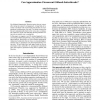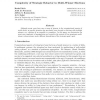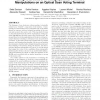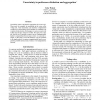33 search results - page 4 / 7 » Manipulation of copeland elections |
AAAI
2010
13 years 6 months ago
2010
The Gibbard-Satterthwaite Theorem asserts that any reasonable voting rule cannot be strategyproof. A large body of research in AI deals with circumventing this theorem via computa...
ATAL
2008
Springer
13 years 7 months ago
2008
Springer
Recent work by Procaccia, Rosenschein and Zohar [14] established some results regarding the complexity of manipulation and control in elections with multiple winners, such as elec...
JAIR
2008
13 years 5 months ago
2008
Although recent years have seen a surge of interest in the computational aspects of social choice, no specific attention has previously been devoted to elections with multiple win...
SAC
2009
ACM
13 years 10 months ago
2009
ACM
The firmware of an electronic voting machine is typically treated as a “trusted” component of the system. Consequently, it is misconstrued to be vulnerable only to an insider...
AAAI
2007
13 years 7 months ago
2007
Uncertainty arises in preference aggregation in several ways. There may, for example, be uncertainty in the votes or the voting rule. Such uncertainty can introduce computational ...




